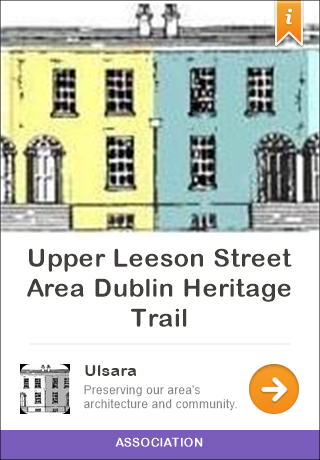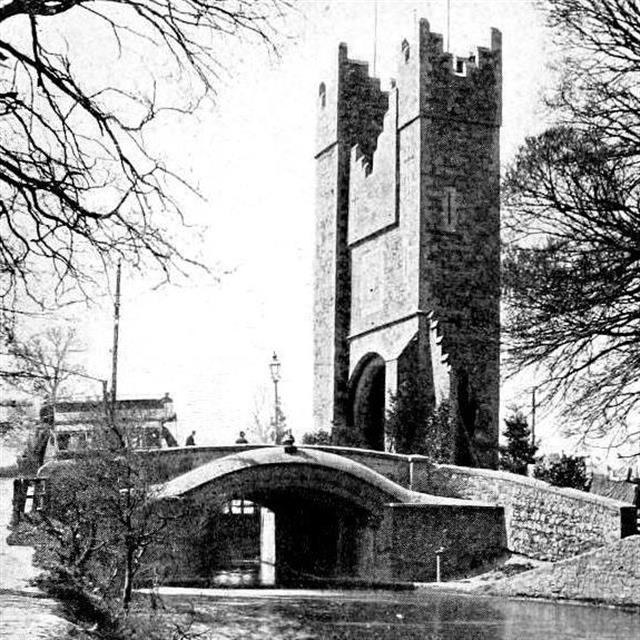Upper Leeson Street Area Dublin Heritage Trail
and use it offline.Interactive multimedia guided tours on the go. Learn more


Leeson Street Bridge, built in 1791 to link the city with the new suburb.

Upper Leeson Street opened up Dublin to a new suburb.

Now the site of a flats complex, Mespil House was originally a gracious townhouse.

Sarah Purser, Artist (1848-1943) lived at Mespil House.

Residence of the US Consul in Ireland.

Home of Percy French.

A bench commemorating Patrick Kavanagh by the canal near the Lock.

Baggot Street Bridge built in 1791.

One of many places in the area where Patrick Kavanagh lived for a period.

The US Embassy, built in 1964.

Covering 32 acres, Herbert Park has been open to the public since 1911.

Raglan Road

St John’s House at 32 Clyde Road, is the Irish headquarters of the Knights of Malta.

St Bartholomew's Church, Church of Ireland.

This area was known at the end of the 19th century as “The Roads”.

Now the Mexican Embassy, Patrick Kavanagh lived here for a time.

19 Raglan Road (and the ICTU)

Jim Larkin, trade-unionist, lived here with his sister Delia, from 1935-1947

Home of Professor Edward Dowden, poet and literary critic (1843-1913)

A sanctuary for wildlife at the junction of Morehampton Road and Wellington Place.

Home to Lafcadio Hearn / Koizumi Yakumo 1850-1904

Home to P.L. Travers, creator of Mary Poppins

63 Upper Leeson Street, last occupied by Eoin McNeill

Home of John Mitchel, Young Irelander and editor of The Nation.

Home of Dr. Richard Best, National Library Director 1934-1940

Home to Carmencita Hederman, Councillor and Lord Mayor of Dublin from 1987.

Home of Robert Briscoe, Lord Mayor of Dublin

Home of The O'Rahilly who died in Easter 1916

Lisney's Estate Agents - one of the few modern buildings in the area.

Built 1972, the hotel replaced an old estate house, Tullamaine Villa

From 1942 run by Mick O'Brien for the classless society that was Leeson Street.

Pub with connection to Joyce and the Invincibles

A set of shops and businesses facing facing the traffic triangle.

Carnac - sculpted in 1979 by Robert (Bob) Mulcahy.

A stretch of shops that have served the area since 1870.

One of the finest streets built in the latter half of the 19th century.

Christ Church Leeson Park

The second incarnation of an Asylum for Blind Females

Now home to the Methodist Centenary Church

Fitzwilliam Lawn Tennis Club at Winton Road

Appian Way

Childhood home of Rosaleen Linehan

Where meetings of the first Dáil were held

Extending from Appian Way to Ranelagh, Chelmsford Road was built in the late 1880s

Home of Padraic Colum, poet, playwright, novelist

Where Frank O'Connor wrote 'Guests of the Nation'

Here the Hawke sisters listed their Religion as Suffragette in the 1911 Census

Home to Rose Skeffington, mother of Frank Sheehy Skeffington

Deirdre Kelly, activist and author is remembered by a memorial at Ranelagh Triangle.

Ranelagh Luas (tram) station arched bridge are remnants of the old Harcourt St line.

Ranelagh Gardens

Now the Northbrook Clinic, No 15 was built as an 'Old Men's Asylum'.

Home to Rev. Dr. Samuel Haughton, calculator of the humane hangman’s drop.

Home to Prof. John Joly, one of Ireland's most eminent scientists.

The last 19th-century square to be developed

Home to Micheál MacLiammóir and Hilton Edwards in the 1930s.

Here, in the 1911 census, Susan Manning listed her Religion as Militant Suffragette.
The area from the Grand Canal between Ranelagh Road and Baggot St, back to Pembroke Road and the Dodder, was built in the 100 years from 1791.
The new suburb was intended for the aspiring professional, military and administrative classes and their servants. From the mid-20th century, uncontrolled development saw houses split into flats, converted to offices and sometimes destroyed.
In 1968, a group of residents formed a residents' association, Ulsara. It has fought a sustained campaign to preserve the architecture and residential character of the area.
In producing this Heritage Trail, we hope to inform, enthuse and inspire you to value the history of the area.
Some content is adapted from Deirdre Kelly's 'Four Roads to Dublin', O'Brien Press, 2001. Other content is from our own research and other posts and publications. We have aimed to give credit where it is due, and apologise for any omissions.
 Working…
Working…